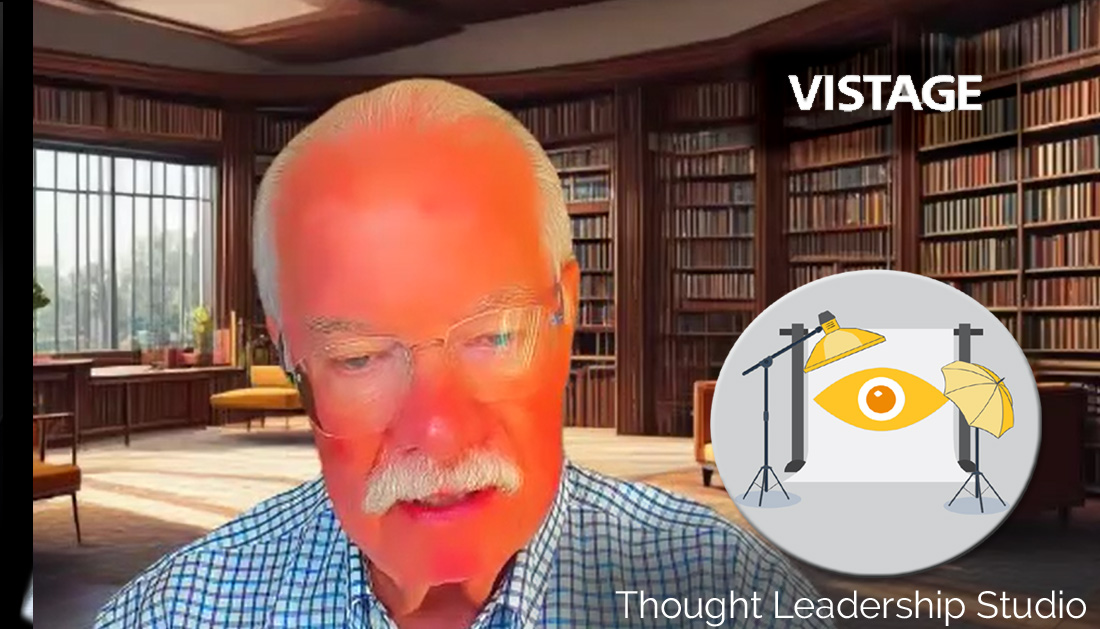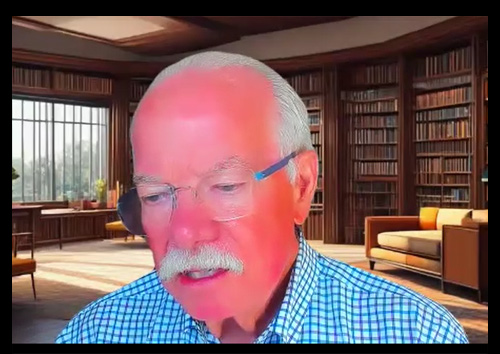Thought Leadership Studio Podcast Episodes:
Mastermind Groups for Strategic Leadership with Bob Carrothers
Episode 81 - Leveraging Peer Feedback and Self-Mastery: How Masterminds Can Facilitate Growth, Accountability, and Strategic Thought Leadership

#ai, #artificialintelligence, #coaching, #consulting, #entrepreneurship, #influence, #interview, #leadership, #management, #mastermindgroups, #meaningfulwork
Or Click here to listen or subscribe on appWhat this episode will do for you
:- Unlock the Power of Mastermind Groups: Learn how mastermind groups provide a collaborative environment where CEOs and leaders can sharpen their skills and gain valuable peer insights.
- Strategic Thought Leadership through Peer Feedback: Discover how mastermind groups facilitate strategic thought leadership by encouraging self-mastery and offering constructive feedback on evolving ideas.
- Personal Growth and Accountability: Explore how these groups help leaders set smart goals, maintain accountability, and achieve both personal and professional growth.
- Addressing Leadership Challenges: Understand how mastermind groups assist leaders in tackling common challenges such as hiring, recruiting, and adapting to new technologies like AI.
- Real-World Success Stories: Hear insightful stories from Bob Carrothers about how peer support and coaching have led to significant business growth and personal fulfillment.
Bob Carrothers.
In this episode, I'm excited to introduce Bob Carrothers, a seasoned CEO coach and expert facilitator of mastermind groups at Vistage Worldwide.
How do mastermind groups facilitate Strategic Thought Leadership (STL)?
Strategic Thought Leadership can thrive when driven by self-mastery and it depends on the evolution of ideas, which can be supported through peer feedback. Mastermind groups, like those led by Bob, offer CEOs and executives the environment to sharpen their leadership skills, challenge their assumptions, and gain valuable insights from peers.
Bob Carrothers brings decades of experience as a former founder and CEO, combined with deep expertise in behavior and cognition, earning him the prestigious Chair Excellence Award six times. At Vistage, Bob fosters a space where leaders can both refine their own strategies and benefit from the collective wisdom of their peers. These groups not only encourage personal growth and self-mastery but also provide critical feedback on evolving ideas, helping leaders make informed decisions and drive superior results.
In our conversation, Bob shares how these mastermind groups accelerate both company and personal growth, emphasizing the importance of setting smart goals, maintaining accountability, and continuously adapting to new challenges. He also offers practical advice on investing in personal development, staying financially vigilant, and anticipating future challenges.
Join us as we explore how Bob Carrothers and Vistage Worldwide empower leaders to achieve Strategic Thought Leadership through the synergy of self-mastery and peer-driven insights.
Some of Bob's coordinates:
Curated Transcript of Interview with Bob Carrothers
The following partial transcript is lightly edited for clarity - the full interview is on audio. Click here to listen.
Chris McNeil: I'm Chris McNeil, with Thought Leadership Studio, and I'm sitting here across Zoom with Bob Carrothers of Vistage Worldwide. With over 28 years of experience guiding CEOs and C-suite executives towards greater success and fulfillment, Bob excels in facilitating peer-to-peer boards where CEOs can sharpen their leadership skills, make informed decisions, and drive superior results.
Beyond board facilitation, he offers individualized coaching access to expert speakers and connections to a global network of over 45,000 successful executives in 35 countries. And what sets Bob apart is his real world experience as a former founder and CEO. Coupled with his deep expertise in behavior and cognition as a certified emerge genetics advisor and predictive index practitioner, his outstanding contributions earned the prestigious chair excellent award six times, underscoring his commitment to empowering CEOs to unlock their full potential. Welcome Bob. Great to have you here.
 Bob Carrothers: Thank you very much, Chris. I'm excited about being here.
Bob Carrothers: Thank you very much, Chris. I'm excited about being here.
Chris McNeil: Fantastic. So maybe to start with giving our listener - who may not be familiar with your work or Vistage at this point - a frame to understand where you're coming from ... Was there a pivotal moment that set you off on this path of doing this type of coaching and peer-to-peer board facilitation?
Where You Go to Get Your Answers Questioned
Bob Carrothers: Yes, definitely. I had a company that I started, well first I had three companies. I sold those to my management team. Then I started a company that failed miserably and I lost a bunch of money and had to close it. It was a real ego hit. And at that point I'd been in one of these groups and I thought, well, I'm looking for another position and I know how to build successful companies and how to be in trouble.
And I thought maybe there's a way I could share my knowledge with others. And so I reached out to my past Vista, it was tech then, but my past Vistage chair and asked him if they were looking for anybody and they just happened to be looking for somebody in Denver. And I hired on and been doing it ever since.
Chris McNeil: Excellent.
Bob Carrothers: That was in 96.
Chris McNeil: Excellent. So that's an interesting concept to me having been a member of and led various mastermind groups over the years as we were discussing before we started recording.
 I'm familiar with the mastermind concept and I know this is not exactly the same thing, but one of the things I really liked about it was for founders and entrepreneurs, there's many of those in our listener base who can probably relate to this. You don't necessarily have a board of directors to report to. You don't have anyone to be directly accountable to. You're it.
I'm familiar with the mastermind concept and I know this is not exactly the same thing, but one of the things I really liked about it was for founders and entrepreneurs, there's many of those in our listener base who can probably relate to this. You don't necessarily have a board of directors to report to. You don't have anyone to be directly accountable to. You're it.
Bob Carrothers: That's it.
Chris McNeil: But you miss a lot by not having that. And by having this kind of peer board that can replace the function of a board of advisors or a board of directors as well as what other kinds of benefits or can you play off of that and help fill out our idea of what this group could do for someone?
Bob Carrothers: Sure. It's a group of up to 18 people. Usually we'll have 14 to 16 in the room at that number and they throw things out to each other that are challenges or the concepts they're thinking about or ideas they have, whatever. It could be an issue in their personal life, marriage might not be working out or kids in trouble. It can be anything.
And the group has been together a while, so they trust each other a lot. It's a group where confidentiality is everything. We don't share what goes on in that room. So the person that's got the topic, we'll throw it out to the group, then we'll ask a lot of questions to see if we really understand it. And then we go around the room and give opinions on what they're thinking or experiences they might've had in this area or ways to just help them be better. We say Vistage is where you go to get your answers questioned.
Creating a Cohesive Group Mind: The Art of Facilitating with a Light Touch
Chris McNeil: I like that. Nice play on words. Do you find in these groups that a group mind or an identity of a group thinking coherently as a whole develops over time?
Bob Carrothers: It does. When you start a brand new group, the groups I have have been going a long time. So when we bring in a new member, they tend to get right in there and go. They'll come in, they'll spend a day with us, they'll watch how we work, we'll get to see that person work and share ideas. And then we will decide if we think they're a fit for the group.
And then we ask that person if they think they're a fit and they're ready to go, if usually they say absolutely and they hit the ground running. I think once they've seen the vulnerability in the group and the type of things going on, first they go, I thought I was the only one that had these problems. And secondly, it's a safe place. I think my job is a space to make magic happen.
Chris McNeil: Oh, I like that.
Bob Carrothers: Yeah, it's so true.
Chris McNeil: So what are the requirements of facilitating a group like that to allow that space to make magic happen?
How would someone do that well versus not?
Bob Carrothers: Well, we go through a lot of training when we're hired on with a company and then it's just experience. It's just doing it for a long time and knowing you got to stop side talking if somebody's going on and on and you got to stop that. And of course politely, the group has to, we call it care confrontation.
They have to be honest with the other members and throw out things that they're thinking that the person presenting might be going down the wrong path or they're going to get in trouble or whatever. So they just build trust. And I sit back and all I really do is call on the people to make their comments and listen to what's going on and interject if I have to my thoughts. I usually do it at the end of the discussion.
 Chris McNeil: So facilitate with a light touch might be one principle.
Chris McNeil: So facilitate with a light touch might be one principle.
Bob Carrothers: Absolutely. That's exactly right.
Chris McNeil: And it seems like that kind of thing can gain a life of its own, an identity of its own. And you have to mention leave room for that.
What kinds of problems to solve or opportunities to take advantage of usually drive the motivation behind an executive CEO founder joining such a group?
Bob Carrothers: Well, the most common issues we're hearing now is hiring. Finding the right people for their companies is a task.
It is hard. And it's also about hiring practices. What could I do better? What do you guys do? That kind of stuff. It's always about growing the business or a problem that might have arisen that they need help with. It just couldn't be anything. It can be anything. I had breakfast with a past member today and when he first came to me, he just had an idea for a company. And today he was telling me that his company is doing about 3 million in EBITDA a year. Excellent. It's incredible. And just to see where he is gone and how he did it. And he was in the group for a number of years and he wants to put more people from his company and other groups that we have.
AI and Blind Spots: The Evolving Landscape of Leadership in the Digital Age
Chris McNeil: So one piece of the puzzle is of course, the challenges we have in hiring and recruiting and training. That's everywhere. That's big one.
But is it not also a general atmosphere of filling in our blind spots that we have as leaders?
Bob Carrothers: Oh, absolutely. Absolutely. That's the duty of the group is to help each other see their blind spots and deal with them. There's a lot of opportunities coming. AI is going to be huge, and these companies are already incorporating AI into a lot of the stuff they do, some more than others. So it's dealing with that too. And there's blind spots around that.
Chris McNeil: Well, there's an interesting topic and as much as you can share, and I know you have to keep certain things confidential from the group, but what kind of ideas are emerging around AI?
Bob Carrothers: Well, we also bring speakers into these meetings. So we've had a couple speakers come in and talk about it and show us what's going on, the bots that are being developed for it, that can save you a lot of time and work in things. So they're incorporating it in everywhere from managing their fleet of trucks to just writing better emails, having people that couldn't write, doing emails, and now they've got chat GPT and they correct their email.
And it's amazing how many of the CEOs have said, this is awesome. The guy's worth a lot more now. And it's also about writing manuals or procedures, job procedures. It's all over the board. I have one company that is in software development and he uses it to write code and check code to be sure that it's workable. And that saved him a ton of time.
Chris McNeil: Yes, I found ChatGPT can really expedite coding projects.
Bob Carrothers: Yes.
Chris McNeil: ... used the right way. It seems to have a limit as to how much you can ask it to do at one time, but if you can chunk your project down, and I love how we're talking about filling in blind spots - and of course, for a lot of us, AI is so new, we all have blind spots about what it is capable of. Cause we just don't know yet ... it's changing so fast.
 And I recall reading about a seminar that an author I like used to give, and he would give it in a typical setting of a hotel conference room. And the exercise he would have the group do is to write down everything they remembered about the hallway coming into the conference room.
And I recall reading about a seminar that an author I like used to give, and he would give it in a typical setting of a hotel conference room. And the exercise he would have the group do is to write down everything they remembered about the hallway coming into the conference room.
It seems simple-minded, but here's what happened From that, then he would put it all up on a board and have people compare to each other. And what they quickly learned that no matter how much somebody noticed any given person in the group, every single one noticed something that they didn't. Nobody's description was complete.
Bob Carrothers: Right.
Chris McNeil: And it's just a wide variance of situational awareness with different levels of detail. But the principle people came out of that with was that everybody's worth listening to because everybody has information that you don't 0 and in some way that they can offer it to help you achieve what you're working to achieve now.
Bob Carrothers: Right.
Chris McNeil: How have you seen that dynamic play out? Do you have any stories you can share?
... Maybe not mentioning names or obscuring the things that could be private, but enough to tell our listener what they could expect in participating in such a group?
Challenging Assumptions: The Value of Honest Feedback in Leadership Groups
Bob Carrothers: You will get your answers questioned, you will see your blind spots. You may hear things you don't want to hear, but it's done in a caring way. We love and respect each other, so we don't say anything hurtful, but we helped point out a blind spot that the person may not even know they have. Yeah, just one topic. I had a guy presented, he wanted to do a bonus to his people.
He was thinking about paying $300,000 in bonuses at the end of the year, and it was more than he could afford for sure. And so he threw that out to the group and the advantages and then disadvantage he thought. And then we went around and then when we were doing our suggestions for him, one of the members said, here, this is what happened to me. He said, I did this once. I paid out $300,000 to employees and I didn't get a thanks, I didn't get anything. And he said, at this point in your growth, I would avoid it. And the member said, wow. He said, that cost me just saved me $300,000 from that position.
Chris McNeil: Absolutely. Yeah. Sometimes we have the idea that money is the primary motivator of employees, but then when you see surveys of the actual employees is usually around number five or six. That's right. After things like recognition and the opportunity to be creative in their work and things like that.
 Bob Carrothers: Absolutely, absolutely. And employees can get entitled to, well, I got $300,000 this year, I'm going to get it next year.
Bob Carrothers: Absolutely, absolutely. And employees can get entitled to, well, I got $300,000 this year, I'm going to get it next year.
Chris McNeil: Yeah, sure.
Bob Carrothers: That's not true for the most part.
Chris McNeil: Absolutely. So you also do coaching individual one-on-one coaching, is that right?
Bob Carrothers: Yes. With the CEOs I work with and their founders and their entrepreneurs and their professional CEOs, I coach each one of 'em individually once a month for about 90 minutes to two hours. And it's all the people are from Denver, so I do it in person. So I'll drive to their office or to a restaurant where we can have a quiet discussion wherever they choose. And then we sit and talk and just several of 'em just use it to voice what they're thinking. They want to hear themselves say it.
And then when they do that, they realize how goofy it could be or how they could tweak things. And then I just ask questions. I listen and ask questions. I watch body language and we have a deep conversation from anywhere from Should I divorce my wife to, should we go down another path of the business or anything? It can be one guy was, he said, you're the first one to hear this, but I've got stage four liver cancer and I'm not going to be around very long. And so we talked about that and that discussion went on each coaching session for about five months until he passed away.
Chris McNeil: That's tough.
Bob Carrothers: I'm so honored to be led into people's lives at that level. It's an honor for me.
Chris McNeil: Yeah, the coaching relationship certainly can be an intimate relationship because it requires that kind openness to really have the leverage to ...
What are some of the themes that you've noticed in terms of the structure the coaching takes or the needs people come to coaching with that you've seen as a pattern amongst different leaders that you think might be systemic?
Bob Carrothers: Geez, I had one member, I was still coaching her that her company had been bought by a PE firm. They'd been owned by a PE firm. They sold them to another PE firm and the culture just didn't fit and it was driving her crazy. So we had a lot of discussions on how she could handle that. What does she see that's important, should she even stay at the company? I mean all over the place. And eventually she left the company.
Chris McNeil: Well, it helped get people clarity sometimes. And I like the sounding board concept and it certainly is a noticeable difference to try to organize your ideas solo as opposed to articulate them to someone and have a sounding board. Right, exactly. So a sounding board function seems to be one theme in the coaching relationship and the openness being part of that.
So if you had to contrast somebody who's in one of these groups, one of these peer-to-peer groups and is also getting coaching with an equivalent person in business who is not getting those benefits, what would be the distinction? What kinds of things would you look for in terms of benefits and performance from somebody who's applying these things?
The Trifecta of Growth: Peer Groups, Coaching, and Expert Insights in Leadership
Bob Carrothers: It would depend on the individual. Each one is unique. What could I say? Over time, they become happier. Their wives or their husbands will say, thank you, you saved my marriage. I've heard that a few times. The kids, they've become better spouses, better fathers, better mothers, just because they can get their head straight about balancing all this stuff. There's just a lot of benefits.
So I see 'em become happier, grow on their abilities in their business. The companies will grow faster about, I think we're like four times faster than the average company.
Chris McNeil: Four times faster??
Bob Carrothers: Yeah.
Chris McNeil: That's amazing. And not surprising at the same time.
 Bob Carrothers: And just between, we bring in the speakers between what they learn there, what the group does for 'em, and then the coaching is a trifecta that just helps 'em grow faster.
Bob Carrothers: And just between, we bring in the speakers between what they learn there, what the group does for 'em, and then the coaching is a trifecta that just helps 'em grow faster.
Chris McNeil: That's excellent. So the accountability loop function, how do you manage that? Do you have your clients or do the members of the group set goals that the group helps hold them accountable to or attract their progress in? Is that part of it?
Because I've been a mastermind groups where that's a primary function and others where it's not discussed at all. It's more just brainstorming and support. Where do you see the right balance of such things?
Bob Carrothers: Well, as far as goals go, we present our goals to the group in January for the year. And then every quarter they will meet with a breakout group and go over their goals and talk about 'em. And the other members will question and see if their thinking is straight and what they're doing as far as, and they hold 'em accountable when they get back together again, first thing they're going to ask is, what'd you do about that? You said you would.
And then in the group discussions, we actually have a three ring binder with a little form that presents who presents the issue or the topic, what they're going to do. And by when, and it's written in the book and the next meeting we come back and say, what'd you do if they committed to do it by the next meeting, which is usual, and we'll just ask them and follow 'em. And if they didn't get it done or they get part of it done, we'll keep that page open and they keep getting asked about it.
Chris McNeil: So is that totally on the onus of the person setting the goal or does the group or you and the coaching capacity help them shape their goals or help pull goals out of them and make them more crystallized and solid and measurable?
Bob Carrothers: It can be both. The group can help 'em do that. I help 'em do that in coaching and we talk about their goals and help 'em really decide if they're, they're achievable or not, if they're smart goals and whatever. So it's a little bit of everything.
Chris McNeil: Well, goal setting is such a broad topic, but it's always helpful to be reminded of the principles of good goal setting. So for our listeners, what would be the principles of good goal setting from you, from your experience in this setting?
***************************************
The transcript is lightly edited for clarity and is a partial transcript- the full interview is on audio. Click here to listen.
***************************************
Free Stuff and Offers Mentioned in Podcast
***************************************
***************************************